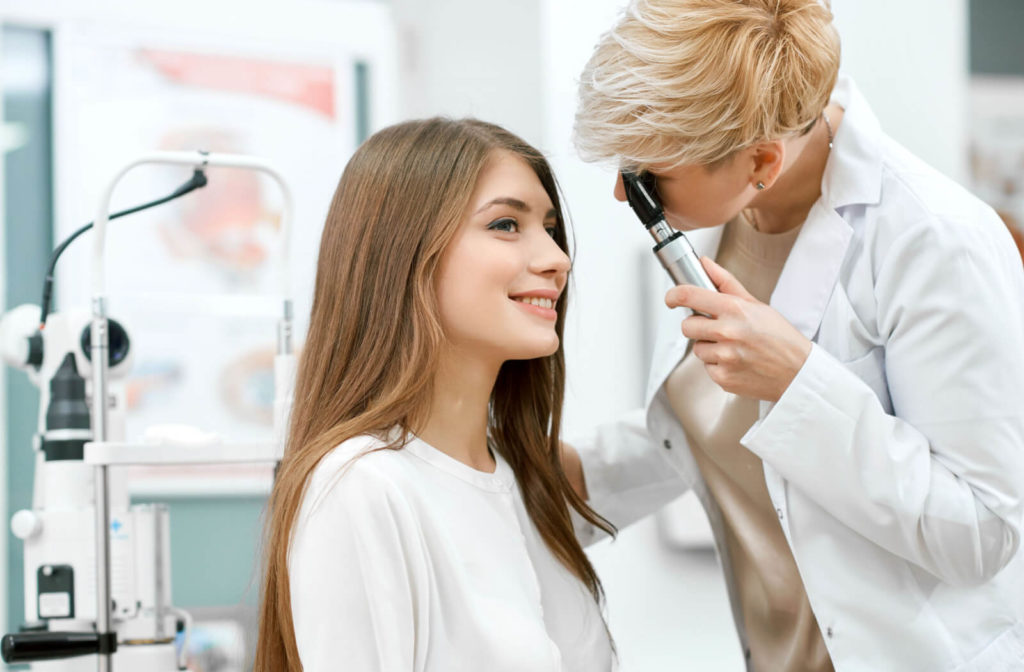Certain eye diseases and health conditions can affect your vision without showing any warning signs. For this reason, comprehensive eye exams are essential for overall eye wellness, even though you may not notice any changes to your vision.
But what is a comprehensive eye exam, how often should you have one, and what does it entail? Learn more as we discuss the benefits of eye exams.
Comprehensive Eye Exams
A comprehensive eye exam assesses many aspects of your vision and eye health through a series of tests. It also typically includes looking at your medical history, ocular needs, and lifestyle considerations.
Eye exams form part of your preventative health care as they help detect and screen for vision-related problems in their early stages. Routine exams can help with prompt diagnosis, treatment, and management of eye diseases.
Common eye diseases include:
Eye Exams for Adults & Seniors
Although eye and vision problems can occur at any age, they can become more prevalent with age. Even the slightest changes can affect your vision and quality of life.
Regular comprehensive eye exams can prevent eye health changes from progressing into vision loss when they are detected early. So, how often should you have an eye exam?
Here is the suggested frequency according to the American Optometric Association:
- Age 18 to 64: Once every 2 years, or annually if recommended or at-risk
- Age 65 and older: Annually or as recommended
Pacific EyeCare Optometry recommends annual comprehensive eye exams for new and at-risk patients to determine overall eye health.
Eye Exams for Children
Children’s eyes and vision continue to develop as they grow. However, they may not know they have an eye problem because they may not know what healthy, clear vision should look like.
Children’s eye exams can track if they are reaching visual milestones for healthy eyes, learning, and other activities. They can detect vision problems and correct them early.
The American Optometric Association recommends infants have their first eye exam between 6 and 12 months.
After their initial eye exam, they should see their optometrist:
- Once between ages 3 and 5, or as recommended
- Once before first grade
- Annually from ages 6 to 17, or as recommended
Tests Included in a Comprehensive Eye Exam
Before conducting any tests, your optometry team may discuss the following:
- Medical history
- Family history of eye conditions
- Concerns you may have
- Medications you take
- Whether you wear corrective lenses
- Your lifestyle
Your comprehensive eye exam will likely feature several tests, including:
- Visual Acuity—Measures the eye’s ability to see at a given distance. A Snellen chart, or eye chart, measures visual acuity by covering one eye while testing the other.
- Visual Field Test—Checks if you have peripheral vision issues or loss of side vision (a common symptom of glaucoma).
- Binocular Vision Test—Checks the alignment and coordination of both eyes together and eye muscle movement.
- Refraction Testing—Checks for a refractive error and the type. Using a phoropter, your eye doctor can determine your prescription for eyeglasses or contact lenses.
- Slit Lamp Test—The light from a slit lamp microscope allows the eye doctor to see the front part of the eye and the inside of the eye.
- Tonometry—Measures pressure in the eye, also known as intraocular pressure. High intraocular pressure can be a sign of glaucoma.
- Pupil Dilation—Pupil dilation using eye drops allows your eye doctor to view and examine the retina, optic nerve, and blood vessels at the back of the eye.
Benefits of a Comprehensive Eye Exam
Comprehensive eye exams can provide immediate feedback. Once your eye exam is complete, your eye doctor can discuss their findings or changes to your prescription.
Other benefits of comprehensive eye exams include:
- Regular eye exams work as a preventative tool for eye health
- Provide eye maintenance and care
- Help with the early diagnosis of vision-threatening eye conditions
- Provide early treatment and management of eye diseases
- Can detect medical conditions such as diabetes and high blood pressure
Eye Exams for Healthy Vision
A comprehensive eye exam is a thorough evaluation of your eyes and visual system. They can help preserve your eyesight so you can enjoy clear and healthy vision for many years. For quality eye care from our knowledgeable and friendly staff, book an appointment with Pacific EyeCare Optometry today.



